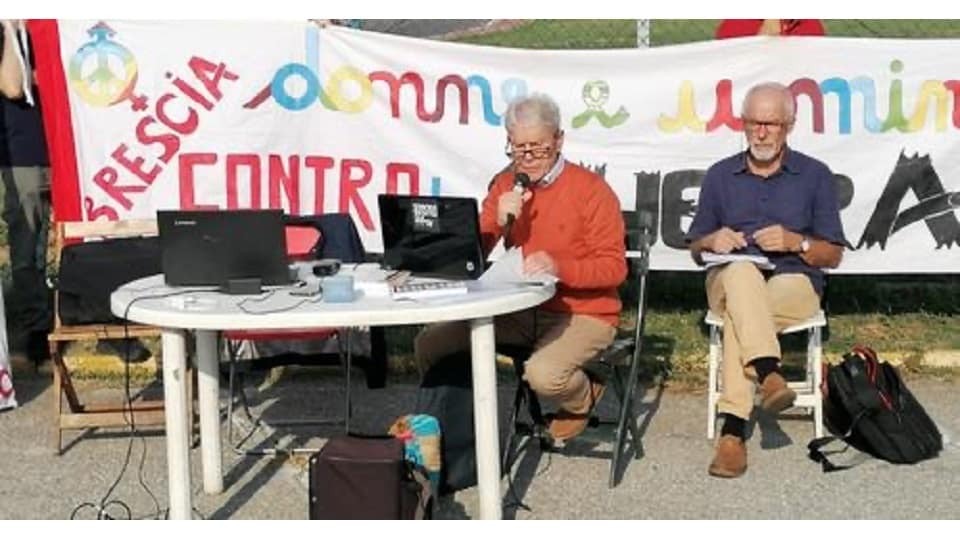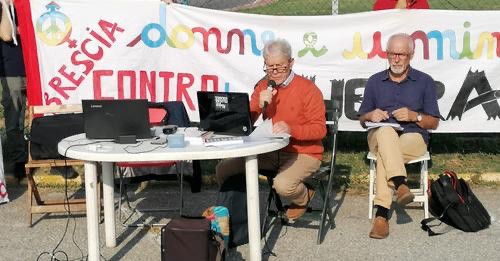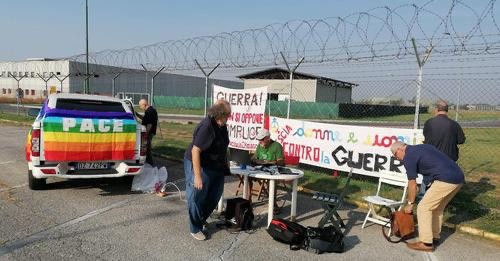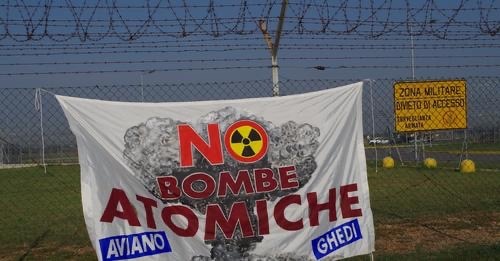By Alessandro Capuzzo
On October 2, the complaint signed individually by 22 members of pacifist and anti-militarist associations was sent to the Prosecutor's Office of the Court of Rome: Abbasso la guerra (Down with war), Donne e uomini contro la guerra (Women and men against war), Associazione Papa Giovanni XXIII (Pope John XXIII Association), Centro di documentazione del Manifesto Pacifista Internazionale (Documentation Center of the International Pacifist Manifesto), Tavola della Pace Friuli Venezia Giulia (Friuli Venezia Giulia Peace Table), Rete Diritti Accoglienza Solidarietà Internazionale ( International Solidarity Welcome Rights Network), Pax Christi, Pressenza, WILPF, Centro sociale 28 maggio (May 28 Social Center), Coordinamento No Triv (No Triv Coordinator), and private citizens.
Among the complainants were university professors, lawyers, doctors, essayists, volunteers, educators, housewives, pensioners, Comboni Fathers. Some of them are well known, such as Moni Ovadia and Father Alex Zanotelli. The spokesperson for the 22 is the lawyer Ugo Giannangeli.
Lawyers Joachim Lau and Claudio Giangiacomo, from IALANA Italia, filed the complaint on behalf of the plaintiffs.
The complaint was illustrated by the promoters in a press conference held, significantly, in front of the Ghedi military base, where authorized sources believe there are nuclear devices.
Photos of the press conference presenting the complaint, in front of the Ghedi nuclear air base
They are asked to investigate the presence of nuclear weapons in Italy and possible responsibilities
The complaint filed on October 2, 2023, before the Prosecutor's Office of the Court of Rome asks the investigating magistrates to investigate, first of all, to determine the presence of nuclear weapons on Italian territory and, consequently, the possible responsibilities, also from from a criminal point of view, due to its importation and possession.
The complaint states that the presence of nuclear weapons on Italian territory can be considered true even though it has never been officially admitted by the various governments that have followed. The sources are numerous and range from journalistic articles that have never been denied to authoritative scientific journals and political events.
The report distinguishes between national and international sources.
Among the first is Minister Mauro's response to a parliamentary question of February 17, 2014, a response that, by attempting to legitimize the presence of the devices, implicitly recognizes their existence. The sources also include a document from the CASD (Center for Higher Defense Studies) and the CEMISS (Military Center for Strategic Studies).
International sources are also numerous. It is worth highlighting the investigation by Bellingcat (association of researchers, academics and investigative journalists) on May 28, 2021. The results of this investigation are paradoxical, since while European governments persist in hiding all information, the US military uses applications to store the large amount of data required for artillery storage. It has happened that the records of these applications have become public domain due to the negligence of the US military in the use of them.
Based on the numerous sources cited, the presence of nuclear devices in Italy can be considered certain, specifically about 90 at the Ghedi and Aviano bases.
The complaint recalls that Italy ratified the Non-Proliferation Treaty (NPT)
The complaint recalls that Italy ratified the Non-Proliferation Treaty (NPT) on April 24, 1975, which is based on the principle that States possessing nuclear weapons (called "nuclear countries") undertake not to transfer nuclear weapons. nature to those that do not possess them (called "non-nuclear countries"), while the latter, including Italy, undertake not to receive and/or acquire direct or indirect control of nuclear weapons (articles I, II, III).
Italy, on the other hand, has not signed or ratified the Treaty for the Prohibition of Nuclear Weapons approved on July 7, 2017 by the UN General Assembly and which entered into force on January 22, 2021. Even in the absence of this signature that would explicitly and automatically qualify the possession of nuclear weapons as illegal, the complaint maintains that the illegality is true.

In the center there is a B61 bomb, on the top left there is an MRCA Tornado, which step by step is replaced by F35 A's.
Next, he makes an analytical review of the different laws on weapons (Law 110/75; Law 185/90; Law 895/67; the TULPS Testo Unico delle leggi di pubblica sicurezza) and concludes by stating that atomic devices fall within the definition of "weapons of war" (Law 110/75) and "materials for weapons" (Law 185/90, art. 1).
Finally, the complaint addresses the question of the presence or absence of import licenses and/or authorizations, given that their verified presence in the territory necessarily presupposes their passage across the border.
The silence about the presence of atomic weapons also inevitably affects the presence or absence of import authorizations. Any authorization would also conflict with article 1 of Law 185/90, which establishes: "The export, import, transit, intra-community transfer and intermediation of weapons material, as well as the transfer of the relevant production licenses and the relocation of production, must adjust to Italy's foreign and defense policy. "Such operations are regulated by the State in accordance with the principles of the Republican Constitution, which repudiates war as a means of settling international disputes."
The complaint points to the Rome Prosecutor's Office as the competent forum for the inevitable involvement of the Italian Government in the management of nuclear weapons.
The complaint, supported by 12 annexes, is signed by 22 activists, pacifists and anti-militarists, some of whom hold high positions in national associations.




